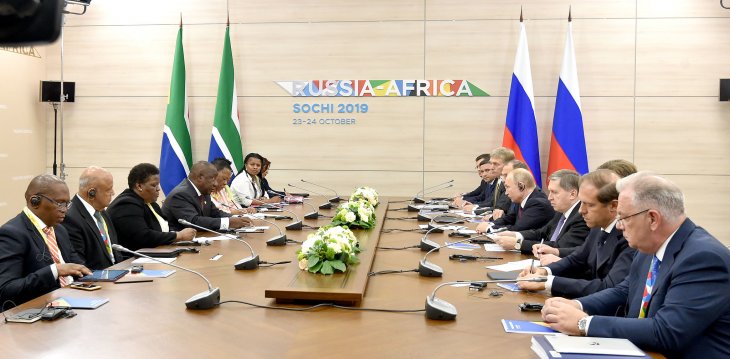Half of the nation states who chose not to condemn Russia’s invasion of Ukraine at the United Nations General Assembly’s extraordinary session on March 2nd were member states of the African Union (AU).
In the event, 25 of the AU’s 55 member states either abstained, did not vote, or voted against the resolution. This apparent split within the AU votes raises an intriguing question of why did the block fail to unite in condemning Russia’s invasion of Ukraine? Voting in the UN is generally motivated by perceived national interests. In this perspective blog, we will use a security standpoint to try to explain what those perceived interests may be.

The first Russia-Africa Summit in Sochi in Russia in 2019. Photo: Government of South Africa via Flickr. CC BY-ND 2.0
We shouldn’t think of African states as a bloc which will naturally step in line with entreaties from Western countries.
As of 2020, 64% of AU member states were classified as not fully democratic; 38% as authoritarian, and 26% as a combination of democratic and authoritarian regimes. In such predominantly undemocratic political landscape, aligning with democratic Western nations may appear to many states as strategically less safe move. Countries may be concerned about whether they will be able to receive guaranteed protection against any Russian retaliation that may destabilise their states, such as supporting one side of a civil war, as it is doing at present in Libya, or a future interstate war.
Africa’s ties with the West have always been tainted with suspicion and mistrust due to the dark history of the slave trade and oppressive colonial regimes. The negative pre-independence experiences have been sustained by Western nations’ contradictory and inconsistent foreign policy when dealing with international crises and human rights violations. When victims are non-Western, and the perpetrators of violence are Western states or state, the West is accused of often adopting double standard. Thus, it is arguable that many Africa states, even those with strong social and economic ties with Western nations, may view the West with scepticism when making decisions that may have immediate or long-term security implications.
A more prosaic reason for supporting Russia may be that many African states, especially Sub-Saharan Africa, continue to have a close security relationship with Russia. Among the 25 African states that abstained, did not vote, or voted against the resolution Russia has important military relationships with all but three (Eritrea, Namibia and Senegal). The security dilemma inherent in Russia’s continued strong influence in the security sphere of African states might have influenced AU member states not to shun Russia in fear of being seen as an enemy.
Analysts have identified bilateral military cooperation agreements covering things like training and supply of equipment between Russia and 14 of the African states that did not support the resolution (Burkina Faso, Burundi Cameroon, Central African Republic, Congo (Republic of), Eswatini, Ethiopia, Guinea, Mali, Morocco, Mozambique, Sudan, Tanzania, Zimbabwe). An example of the close cooperation that these agreements can entail, a Russian citizen has been appointed to be National Security Advisor to the President of the Central African Republic (CAR). Russia has supplied the CAR with arms and military training, and Russian private military companies have operated there.
Arms sales are a physical manifestation of security ties between the supplier and the purchaser. According to data collected by SIPRI, Russia was the largest arms supplier of major conventional weapons such as tanks or fighter aircraft to sub-Saharan Africa during the period 2016-2020. This recent pre-eminence built upon a decades long history of being a significant arms supplier and security partner to the region that dates back to the Cold War.
Specifically, Russia was largest supplier of major weapons during the period 2016-2020 to eight states that did not support the UN resolution (Algeria, Angola, Burkina Faso, Equatorial Guinea, Ethiopia, Cameroon, Mali, South Sudan). Russia was also the largest supplier to two more over a longer period (South Africa after 2013 and Uganda after 2010), and it was the second largest supplier during 2016-2020 to a further four states (Burundi, Central African Republic, Mozambique and Sudan).
Another manifestation of close security links if the deployment of Russian private military companies such as the Wagner Group which have close links to the Russian state. Such companies have been identified as having operated in seven states that didn’t support the UN resolution (Central African Republic, Guinea Bissau, Madagascar, Mali, Mozambique, Sudan and Zimbabwe). For example, in a few months after a 2021 coup d’état in Mali the Russian Wagner Group began a large scale operation in Mali whose aim is reported to be to train Malian forces and provide security to senior Malian officials. When security for the leadership is provided by a Russian company it is not hard to assume why Mali didn’t vote to condemn Russia in the United Nations.
Russia is a preferred arms supplier for many states as it has a reputation of being willing to supply arms or other military services without the concerns about democracy or human rights sometimes championed by Western states. In more general terms, many African states are in what is for them an advantageous position as China, Russia, the US and European states compete for influence on the continent by offering arms and security partnerships. If there is a long-term geopolitical realignment by the West against Russia, African governments may find it difficult if they are expected to align themselves with one bloc or another. Abstaining at the UN perhaps represented a desire for many to remain ‘non-aligned’, but they may not be able to continue that stance indefinitely.
- Hassan Aden is a Doctoral Researcher at PRIO.
- Nic Marsh is a Senior Researcher at PRIO.